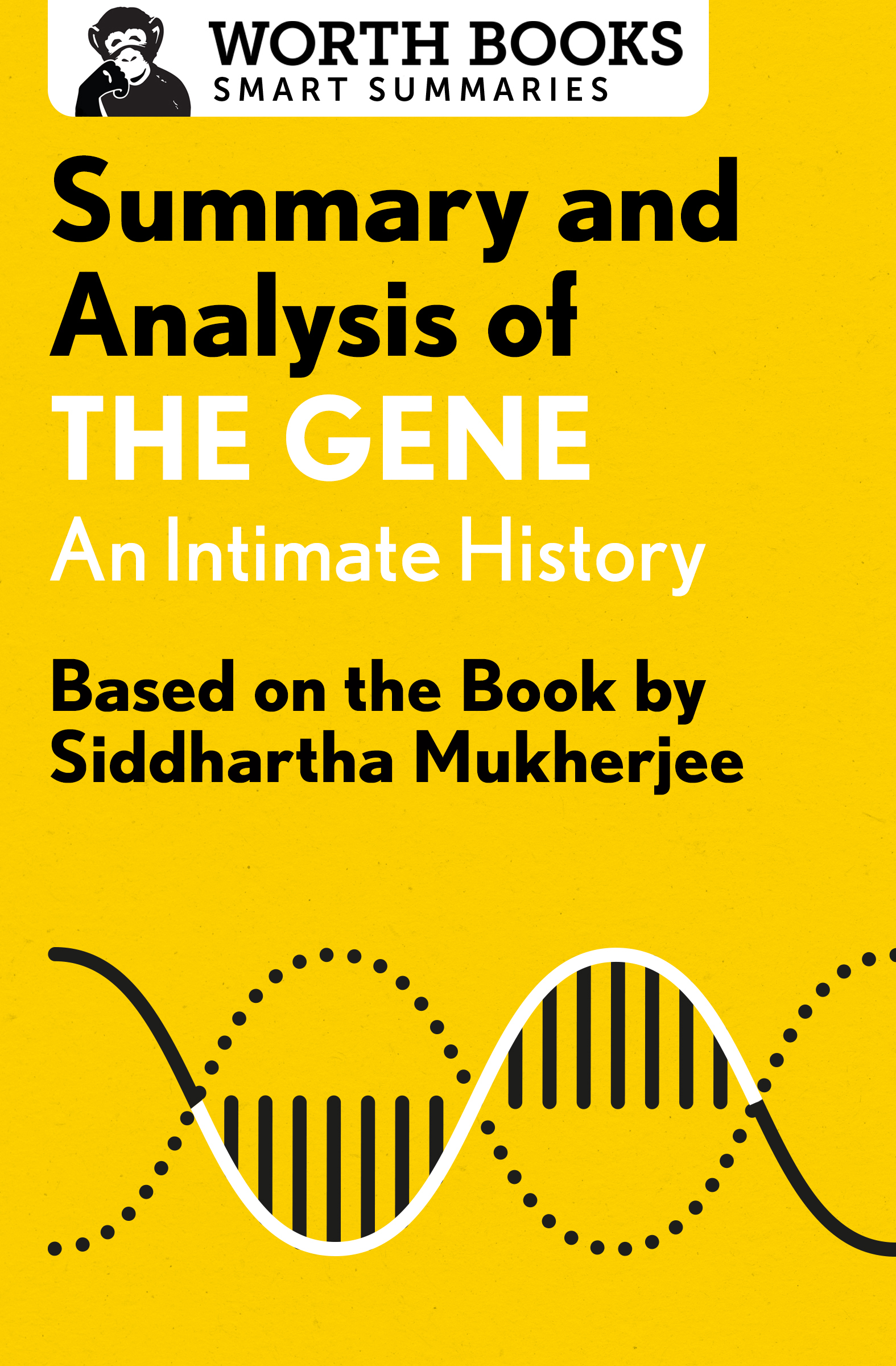Contents
Summary and Analysis of
The Gene
An Intimate History
Based on the Book by Siddhartha Mukherjee

Context
The Gene was published in May 2016, thirteen years after the mapping of the human genome was completed and only a year after the announcement that an efficient method for modifying human genes had been discovered. Siddhartha Mukherjee, the Pulitzer Prizewinning author of The Emperor of All Maladies, describes the evolution of genetic science from its infancy in the late 19th century up to the present day, when the idea that many human traits or characteristicsincluding sexual preference and intelligenceare largely genetic in nature has taken hold in public discourse.
The larger questions center on the very real possibility of modifying the human genome. Now that the science has advanced to the point where this is possible, who should make the choice as to whether it should be done, if at all? Will gene modification be used to eliminate diseases, or for some less noble purpose? The 20th century has already provided lessons on how genetic science can be used to justify atrocities. Today the gene is, more than ever, a dangerous idea, and how it is put to use will have an enormous influence on humanitys future.
Overview
The Gene: An Intimate History is a rigorously scientific, broadly historical, and candidly personal account of the development of the science of genetics, of the dramatic ways genes can affect us, and of the enormous moral questions posed by our ability to manipulate them.
Siddhartha Mukherjee begins by explaining how three members of his family were unraveled by genetic mental illness. He uses this story to introduce the gene itself and the history of genetics. Like the byte in digital data or the atom in matter, the gene is the most basic unit of information in biology, the lowest common denominator of living organisms. Understanding it is essential to understanding human biology, illness, wellness, temperament, and personality. And, as the author states, the centuries-old quest to control the gene has caused it to become one of the most powerful and dangerous ideas in the history of science.
The books structure is historical and chronological. It begins in 350 BC with Aristotles surprisingly accurate theories of heredity, and ends in 2015, when the technology to modify the genome of a human embryo may be only a few experiments away. Across this vast stretch of time, The Gene recounts humanitys fascination with how human traits are inherited, through the stories of the scientists who deciphered the mystery: Gregor Mendel, the Augustinian monk whose research on pea plants in his abbey garden provided the first glimpse of heredity; Charles Darwin, the onetime theology student who advanced the theory of evolution by natural selection; and, in our time, the men and women who took on the immense, daunting task of mapping the entire human genome. The story progresses chapter by chapter like a scientific whodunit, in which each new discovery answers one question but raises another.
Apart from explaining the science of the gene, Mukherjee chronicles its effects on societynot as a biological entity, but as an idea. The emergence of genetics in the early 20th century spawned the eugenics movement, which sought to improve the human race through selective breeding. This notion was later put to horrific use in Nazi Germany, where genetic experiments were performed on concentration camp prisoners, and in the Soviet Union, where brainwashing and re-education programs were carried out on dissidents.
More sobering, if less well known, is the story of the eugenics movement in the United States, where thousands of forced sterilizations were performed in the 1920s and 30s on women diagnosed as feebleminded.
Although much of the content of The Gene is highly technical, the explanations are informed by analogies, some of them folksy, others contemporary, all of them engaging. To describe how, even today, medicines are able to affect only a tiny fraction of the human bodys molecules, Mukherjee tells us: If human physiology is visualized as a vast global telephone network medicinal chemistry is a pole operator in Wichita tinkering with a few lines in the networks corner.
As The Gene traces its chronological arc, Mukherjee returns time and again to the story of his family. He speaks frankly, almost clinically, about the mental illnesses affecting his uncles and cousin and the genetic ailment suffered by his father (normal pressure hydrocephalus, or NPH). Nor does he spare himself from examination; the realization that these traits could be passed on leads him to speculate uponand even calculate, mathematicallythe chances that he or his daughters might be likewise affected.
In another context, this might seem self-indulgent. But The Gene is not the intimate history of the author alone. Anyone who reads it will inevitably wonder about their own inherited traits of biology and personality, the illnesses in their family, and the possibilities offered by gene therapy. Perhaps more importantly, they will also reflect on the huge ethical questions that arise from our knowledge of the tiniest unit of information in the human body.
Summary
Prologue: Families
Mukherjees uncles Rajesh and Jagu and his cousin Moni have all suffered from mental illnesses with genetic origins. Their stories serve to introduce the gene, the fundamental unit of heredity that holds the key to the physical and emotional characteristics of each human life.
Need to Know: No understanding of human biologyphysiology or behaviorcan be complete without first understanding the nature of the gene.
Part One: The Missing Science of Heredity
The Discovery and Rediscovery of Genes (18651935)
The Walled Garden
The concept of the gene was first formed by Gregor Johan Mendel in 1865. However, theories of how human traits are transmitted date back to Aristotle, who theorized that they were contained in instructions within the body that were passed on from generation to generation.
Aristotles theories of heredity were surprisingly accurate; but after him, little progress was made in genetics until the 19th century.
The Mystery of Mysteries
Charles Darwins 18311836 voyage to South America and the Pacific to collect animal specimens and fossils of their predecessors led him to believe that new species were created in a struggle for survival. The ones best equipped to adapt to shifting conditions would endure, in a process of natural selection.
Need to Know: Darwins On the Origin of Species proposed the theory of evolution but did not provide an explanation for how heredity works.
The Very Wide Blank
Darwin later sought to explain heredity with the theory of pangenesis. He believed that tiny particles called gemmules , contained within the cells of living organisms, passed on their essential traits to their offspring, blending the characteristics of both mother and father. His colleagues dismissed the theory because it did not explain why some traits disappeared and then reappeared in later generations.
Need to Know: Darwins failure to explain heredity came about in part because he was a brilliant naturalist, but not adept at carrying out experiments.
Flowers He Loved
Gregor Mendels research breeding hybrid pea plants led him to conclude that the traits of organisms must be contained in single, indivisible units. Although he did not invent the term, Mendel had identified the fundamental qualities of what we call a gene today.










